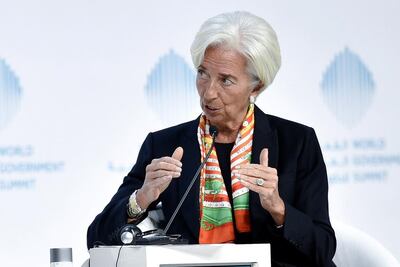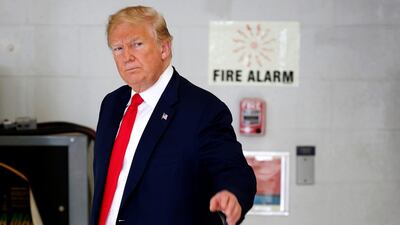The International Monetary Fund (IMF) has joined criticism of President Donald Trump’s plan to impose tariffs on metal imports from key US allies, which came into force on Thursday, saying there would be no winners from a “protracted trade war” as countries spun out retaliatory taxes on exports to the US and Brussels filed legal challenges against the US and China.
“Everybody loses in a protracted trade war, we encourage countries to work constructively together to reduce trade barriers and resolve trade disagreements without resort to exceptional measures,” the IMF’s spokesman and director of communications Gerry Rice said in a statement on Friday.
Christine Lagarde, managing director of the Washington-based lender, also criticised Mr Trump's move in a tweet from the G7 Symposium in Whistler, Canada. “At the end of the day, if #trade is massively disrupted, if the level of trust among economic actors is severely damaged, those who will suffer most are the poorest people #G7,” she wrote.

The Trump administration is slapping 25 per cent tariffs on steel imports and 10 per cent tariffs on aluminium imports from the European Union (EU), Canada and Mexico despite global outcry when the proposals were first announced via a tweet from the president in March. The decision was said to take effect from midnight on Thursday.
The IMF warned in March that the move would dent global trade and curtail economic growth.
It was hoped that Canada and the EU – the biggest sources of foreign aluminium and steel respectively for the US – would win an extended grace period before the policy took effect. But this has not happened, and countries have begun retaliating by announcing their own taxes on trade.
“These tariffs are an affront to the long standing security partnership between Canada and the United States,” said Canadian prime minister Justin Trudeau, as Canada hit back with retaliatory duties on US imports worth up to 16.6 billion Canadian dollars ($12.8bn).
Meanwhile, the EU, concerned over the impact of Trump’s decision and a deepening tit-for-tat on the subject between the US and China, lodged legal challenges against the two countries with the World Trade Organization (WTO) on Friday.
“If players in the world don't stick to the rule book the system might collapse. That is why we are challenging the US and China at the WTO,” EU trade commissioner Cecilia Malmstrom told a news conference in Brussels.
_______________
Read more:
Trump tariffs on US allies draw retaliation threats
IMF's Lagarde says US import tariffs may hit global growth
Gary Cohn resigns as Trump economic adviser amid trade dispute
China says it may hit back at proposed US tariffs on imported steel, aluminium
________________
News of the legal challenge came after the EU’s foreign policy chief Federica Mogherini insisted earlier on Friday the EU was “not at war with anyone”. The EU is “a peace project, including on trade”, she said.
European Commission president Jean-Claude Juncker said the 28-nation EU would announce “counter-balancing measures” following the US decision. The EU previously said it was considering tariffs on US products including cranberries, motorcycles, peanut butter and Levi’s jeans.
Meanwhile, European leaders remain outraged. French president Emmanuel Macron described the US move as a mistake, the UK’s international trade secretary Liam Fox called it “patently absurd”, and Germany’s economy minister Peter Altmaier said on Friday: “We hope the European response will result in a process of reflection in the USA.”
“It is unfortunate that trade tensions are rising at a moment where the global recovery is being supported by trade,” the IMF’s Mr Rice said in his statement. In January the IMF lifted its forecasts for global GDP growth to 3.9 per cent in 2018 and 2019, from 3.7 per cent, on rising global economic activity.
“For the first time in a long time, trade is growing faster than global GDP, and spreading recovery around the world. Because of trade and innovation, billions of people today enjoy longer, healthier, and more prosperous lives,” Mr Rice added.

